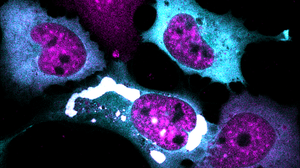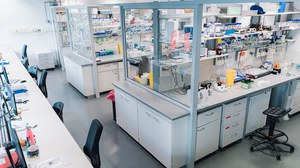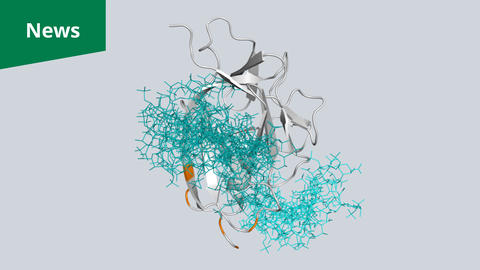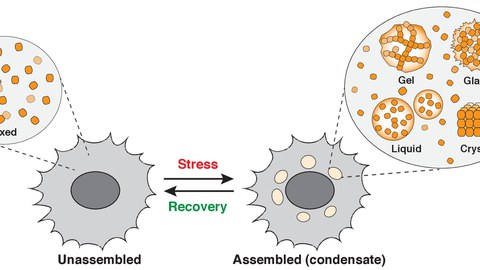Research mission
Although significant progress has been made, our understanding of the organization of the cytoplasm and the function of membraneless compartments in cellular physiology remains limited. Our research group is dedicated to uncovering the molecular principles that govern cytoplasmic organization, with a particular focus on how it transforms in response to environmental stress. Under such conditions, cells must adjust their physiology and metabolism to adapt, often involving changes in the structure of the cytoplasm and the formation of biomolecular condensates. Our goal is to decipher how these changes contribute to organismal survival and to explore their potential role in the development of diseases.
 © Titus M. Franzmann
© Titus M. Franzmann
Our research
The cytoplasm is a mysterious jelly-like substance that sustains the biochemical reactions that are vital for life. Understanding its organization remains a major challenge.
Cells organize their cytoplasm by forming compartments. While membrane-bound compartments have been studied for decades, membraneless compartments, also called biomolecular condensates, are just beginning to be understood. Biomolecular condensates form through biophysical phase transitions and are crucial for cell organization and function. However, as cells age, their ability to form proper condensates declines, leading to aberrant condensates linked to aging and diseases like neurodegeneration and cancer. Consequently, current research is focused on understanding how condensates are connected to age-related diseases.
Our lab investigates the molecular mechanisms that control the organization of the cytoplasm using biochemical, biophysical, genetic, and cell biological methods. We study various model systems, including yeast and mammalian cells, to explore how biomolecular condensates respond to environmental stress. We propose that stress-induced condensates help cells to quickly adapt to changing conditions. Additionally, condensates create specialized microenvironments that enhance or inhibit key biochemical processes in cells, such as signaling, DNA damage repair, transcription, or translation.
read more about our research focus
Recent publication: Intra-condensate demixing of TDP-43 inside stress granules generates pathological aggregates












